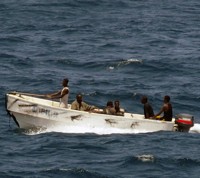EU naval forces operating off the coast of Somali conducted their first raid on the Somali mainland earlier this month. In an email interview, Hans-Georg Ehrhart, the head of the Center for European Peace and Security Studies of the Institute for Peace Research and Security Studies at the University of Hamburg, discussed the EU’s anti-piracy operation.
WPR: What is the makeup of the European Union's Operation Atalanta, in terms of force commitments and contributing countries, and how has it evolved over time?
Hans-Georg Ehrhart: Operation Atalanta was launched in 2008 and has seen its mandate extended several times, now running to the end of 2014. It operates off the coast of Somalia with up to seven combat vessels, one or two auxiliary ships, 1,400 sailors, eight helicopters, five maritime patrol and reconnaissance aircraft and force multipliers such as medical support. Its main task is to protect vessels of the U.N. World Food Program (WFP) delivering food aid to displaced people in Somalia and of the African Union Mission in Somalia (AMISOM). Its secondary task is to protect vulnerable shipping and to deter, prevent and repress acts of piracy and armed robbery in the area of operation. Finally, Atalanta contributes to monitoring fishing activities. In addition to the European Union member states, non-EU countries including Norway, Croatia and Ukraine contribute to the operation.

